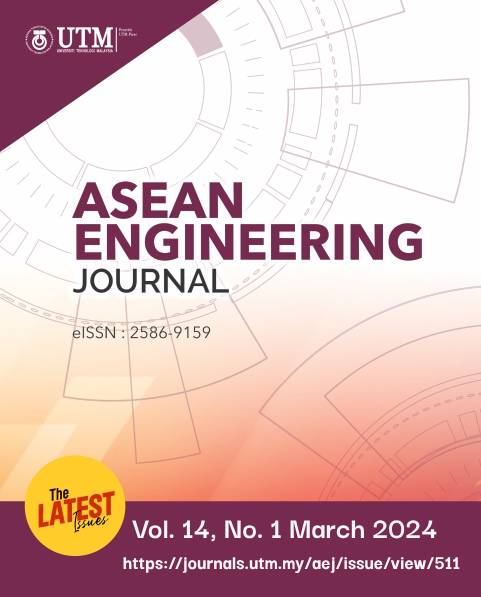AUTOMATION OF PETROLEUM STORAGE TANK LEAKAGE THROUGH PRODUCT TRANSFER CONTROL USING PROGRAMMABLE LOGIC CONTROLLER
DOI:
https://doi.org/10.11113/aej.v14.20360Keywords:
Flammable Gas Detector (FGD), Ladder diagram, Leak, Programmable Logic Controller (PLC), Storage tankAbstract
Industrial storage tanks have always been a critical part of the petrochemical industry due to their capacity to either act as a buffer to other plant processes or simply to store enormous amounts of fluids for a long period of time in a controlled environment. These petroleum storage tanks are supposedly constructed to follow specific sets of instructions guided by the American Petroleum Industry from the type of material used up to the welding procedure. But due to inefficient construction, unmaintained and uninspected problems, welding defects, and environmental concerns among others, a leak in a storage tank can occur and will be a major problem as this can cause fire, explosion, and environmental hazards. Additionally, due to tensions between Ukraine and the Russian government and the succeeding Russian ban on oil imports, the cost of 1 barrel of oil rises at an alarming since 2020. With that in mind, an automation procedure is proposed by the researchers, to save as much of this oil from leaking and being unusable and to reduce the causes of further accidents. This paper not only seeks to use an existing tank layout, with currently installed level indicator transmitters, motor-operated control valves, and other equipment, but also to introduce flammable gas detectors that could detect the leaked petroleum on the ground and would initiate the automation procedure. The automation setup was realized by flowcharts, PLC, and ladder logic simulation using Picosoft software. Automation procedures are analyzed wherein the tanks are being filled, the trucks are being loaded, a leaking tank has its contents pumped to another tank, and a leaking tank has its contents pumped to the truck loading station. Results show that a minimum number of 8.89 barrels of oil saved could breakeven the cost of an estimated amount of $80-90 dollars per barrel of oil can be saved by the proposed automation.
References
Huang, K., Chen, G., Khan, F., Yang, Y., 2021. Dynamic analysis for fire-induced domino effects in chemical process industries. Process Safety and Environmental Protection. 148: 686-697. DOI: https://doi.org/10.1016/j.psep.2021.01.042
Chang, J., Lin, C., 2005. A study of storage tank accidents. Journal on Loss Prevention in the Process Industries. 19(1): 51-59. DOI: https://doi.org/10.1016/j.jlp.2005.05.015
Flores, L.I.R., García, J.A.E., 2014. Modernization of National Oil Industry in Mexico: Upgrading with IEC61850. IEEE Access. 2: 571-576. DOI: https://doi.org/10.1109/ACCESS.2014.2320507
Yuan, Z., Qin, W., Zhao J., 2017. Smart manufacturing for the oil refining and petrochemical industry. Engineering. 3(2): 179-182. DOI: https://doi.org/10.1016/J.ENG.2017.02.012
Oil Price, 2022. Oil Price Charts. Available Online at: https://oilprice.com/oil-price-charts/, Accessed on June 20, 2022.
Department of Energy, 2022. Oil Monitor as of 14 June 2022. Available Online at: https://www.doe.gov.ph/oil-monitor?withshield=1, Accessed on June 20, 2022.
Meratla, Z.,1990. Approach to a leak on an LNG tank bottom. Journal on Hazardous Materials. 24(1): 67-75. DOI: https://doi.org/10.1016/0304-3894(90)80003-M
Cirimello, P.G., Otegui, J.L., Ramajo, D., 2019. A major leak in a crude oil tank: Predictable and unexpected root causes. Engineering Failure Analysis. 100: 456-469. DOI: https://doi.org/10.1016/j.engfailanal.2019.02.005
Godoy L., 2016. Buckling of vertical oil storage steel tanks: Review of static buckling studies. Thin-Walled Structures. 103: 1-21. DOI: https://doi.org/10.1016/j.tws.2016.01.026
Ramírez Olivar, O.J., Mayorga, S.Z., Giraldo, F.M., Sánchez-Silva, M., Salzano, E., 2018. The effects of extreme winds on industrial equipment. Chemical Engineering Transactions. 67: 871-876. DOI: https://doi.org/10.1016/j.ress.2019.106686
Reniers, G., Khakzad, N., Cozzani, V., Khan, F., 2018. The impact of nature on chemical industrial facilities: Dealing with challenges for creating resilient chemical industrial parks. Journal of Loss Prevention in the Process Industries. 56: 378-385. DOI: https://doi.org/10.1016/j.jlp.2018.09.010
Huang, M., Chen, G., Yang, P., Hu, K., Zhou, L., Men, J., Zhao, J., 2022. Multi-hazard coupling vulnerability analysis for buckling failure of vertical storage tank: Floods and hurricanes. Process Safety and Environmental Protection. 161: 528-541. DOI: https://doi.org/10.1016/j.psep.2022.03.037
Landucci, G., Antonioni, G., Tugnoli, A., Cozzani, V., 2012. Release of hazardous substances in flood events: damage model for atmospheric storage tanks. Reliability Engineering & System Safety. 106: 200-216. DOI: https://doi.org/10.1016/j.ress.2012.05.010
Bi, S., Kiaghadi, A., Schulze, B.C., Bernier, C., Bedient, P.B., Padgett, J.E., Rifai, H., Griffin, R.J., 2021. Simulation of potential formation of atmospheric pollution from aboveground storage tank leakage after severe storms. Atmospheric Environment. 248. DOI: https://doi.org/10.1016/j.atmosenv.2021.118225
Li, L., Chen, H., Huang, Y., Xu, G., Zhang, P., 2022. A new small leakage detection method based on capacitance array sensor for underground oil tank. Process Safety and Environmental Protection. 159: 616-624. DOI: https://doi.org/10.1016/j.psep.2022.01.020
He, J., Yang, L., Ye, M., Yang, D., Li, A., Huang, L., Zhan, Y., 2020. Simulation and application of a detecting rapid response model for the leakage of flammable liquid storage tank. Process Safety and Environmental Protection. 141: 390-401. DOI: https://doi.org/10.1016/j.psep.2020.04.053
Lee, S.G., Kwon, K.S., Kim, B.J., Choi, N.C., Choi, J.W., Lee, S., 2019. Detection of oil leakage in soil by monitoring impedance using time domain reflectometry and hydraulic control system. Process Safety and Environmental Protection. 127: 267-276. DOI: https://doi.org/10.1016/j.psep.2019.05.023
Morsi, I., El-Din, L.M., 2012. Scada system for oil refinery control. Measurement. 47: 5-13. DOI: https://doi.org/10.1016/j.measurement.2013.08.032
Suneel, G., Mahashabde, M., Borkotoky, R., Sharma, N. K., Pradeep, M. P., J.K.Gayen, Pimparkar, H. R., & Ravi, K. V., 2021. Radar level measurement in Joule Heated Ceramic melter: A novel technique. Nuclear Engineering and Technology. 53(4): 1176–1180. DOI: https://doi.org/10.1016/j.net.2020.09.010
Zhao, Y., & Wang, W.-qing., 2013. Discussion on test method of detectors for flammable gases. Procedia Engineering. 52: 630–633. DOI: https://doi.org/10.1016/j.proeng.2013.02.197
Kang, S., Park, S., Lee, D., Kim, Y., & Kim, D., 2011. A study on the stem friction coefficient behavior of motor-operated valves. Nuclear Engineering and Design. 241(3): 961–967. DOI: https://doi.org/10.1016/j.nucengdes.2011.01.017
Do Supply Inc., 2022. 1760-L18NWN-EX | Allen Bradley PLC 1760 Pico Controllers. Available Online at: https://www.dosupply.com/automation/allen-bradley-plc/1760-pico-controllers/1760-L18NWN-EX, Accessed on June 20, 2022.
















